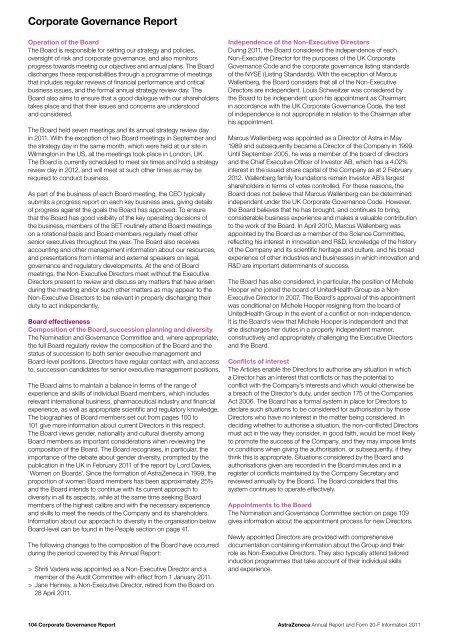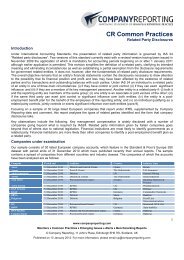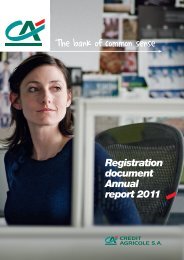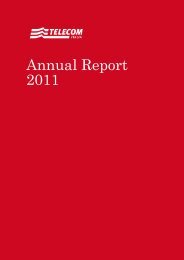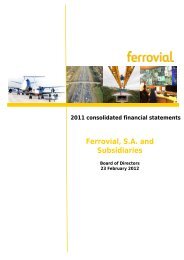AstraZeneca Annual Report and Form 20-F Information 2011
AstraZeneca Annual Report and Form 20-F Information 2011
AstraZeneca Annual Report and Form 20-F Information 2011
- No tags were found...
Create successful ePaper yourself
Turn your PDF publications into a flip-book with our unique Google optimized e-Paper software.
Corporate Governance <strong>Report</strong>Operation of the BoardThe Board is responsible for setting our strategy <strong>and</strong> policies,oversight of risk <strong>and</strong> corporate governance, <strong>and</strong> also monitorsprogress towards meeting our objectives <strong>and</strong> annual plans. The Boarddischarges these responsibilities through a programme of meetingsthat includes regular reviews of financial performance <strong>and</strong> criticalbusiness issues, <strong>and</strong> the formal annual strategy review day. TheBoard also aims to ensure that a good dialogue with our shareholderstakes place <strong>and</strong> that their issues <strong>and</strong> concerns are understood<strong>and</strong> considered.The Board held seven meetings <strong>and</strong> its annual strategy review dayin <strong>20</strong>11. With the exception of two Board meetings in September <strong>and</strong>the strategy day in the same month, which were held at our site inWilmington in the US, all the meetings took place in London, UK.The Board is currently scheduled to meet six times <strong>and</strong> hold a strategyreview day in <strong>20</strong>12, <strong>and</strong> will meet at such other times as may berequired to conduct business.As part of the business of each Board meeting, the CEO typicallysubmits a progress report on each key business area, giving detailsof progress against the goals the Board has approved. To ensurethat the Board has good visibility of the key operating decisions ofthe business, members of the SET routinely attend Board meetingson a rotational basis <strong>and</strong> Board members regularly meet othersenior executives throughout the year. The Board also receivesaccounting <strong>and</strong> other management information about our resources,<strong>and</strong> presentations from internal <strong>and</strong> external speakers on legal,governance <strong>and</strong> regulatory developments. At the end of Boardmeetings, the Non-Executive Directors meet without the ExecutiveDirectors present to review <strong>and</strong> discuss any matters that have arisenduring the meeting <strong>and</strong>/or such other matters as may appear to theNon-Executive Directors to be relevant in properly discharging theirduty to act independently.Board effectivenessComposition of the Board, succession planning <strong>and</strong> diversityThe Nomination <strong>and</strong> Governance Committee <strong>and</strong>, where appropriate,the full Board regularly review the composition of the Board <strong>and</strong> thestatus of succession to both senior executive management <strong>and</strong>Board-level positions. Directors have regular contact with, <strong>and</strong> accessto, succession c<strong>and</strong>idates for senior executive management positions.The Board aims to maintain a balance in terms of the range ofexperience <strong>and</strong> skills of individual Board members, which includesrelevant international business, pharmaceutical industry <strong>and</strong> financialexperience, as well as appropriate scientific <strong>and</strong> regulatory knowledge.The biographies of Board members set out from pages 100 to101 give more information about current Directors in this respect.The Board views gender, nationality <strong>and</strong> cultural diversity amongBoard members as important considerations when reviewing thecomposition of the Board. The Board recognises, in particular, theimportance of the debate about gender diversity, prompted by thepublication in the UK in February <strong>20</strong>11 of the report by Lord Davies,‘Women on Boards’. Since the formation of <strong>AstraZeneca</strong> in 1999, theproportion of women Board members has been approximately 25%<strong>and</strong> the Board intends to continue with its current approach todiversity in all its aspects, while at the same time seeking Boardmembers of the highest calibre <strong>and</strong> with the necessary experience<strong>and</strong> skills to meet the needs of the Company <strong>and</strong> its shareholders.<strong>Information</strong> about our approach to diversity in the organisation belowBoard-level can be found in the People section on page 41.The following changes to the composition of the Board have occurredduring the period covered by this <strong>Annual</strong> <strong>Report</strong>:> Shriti Vadera was appointed as a Non-Executive Director <strong>and</strong> amember of the Audit Committee with effect from 1 January <strong>20</strong>11.> Jane Henney, a Non-Executive Director, retired from the Board on28 April <strong>20</strong>11.Independence of the Non-Executive DirectorsDuring <strong>20</strong>11, the Board considered the independence of eachNon-Executive Director for the purposes of the UK CorporateGovernance Code <strong>and</strong> the corporate governance listing st<strong>and</strong>ardsof the NYSE (Listing St<strong>and</strong>ards). With the exception of MarcusWallenberg, the Board considers that all of the Non-ExecutiveDirectors are independent. Louis Schweitzer was considered bythe Board to be independent upon his appointment as Chairman;in accordance with the UK Corporate Governance Code, the testof independence is not appropriate in relation to the Chairman afterhis appointment.Marcus Wallenberg was appointed as a Director of Astra in May1989 <strong>and</strong> subsequently became a Director of the Company in 1999.Until September <strong>20</strong>05, he was a member of the board of directors<strong>and</strong> the Chief Executive Officer of Investor AB, which has a 4.02%interest in the issued share capital of the Company as at 2 February<strong>20</strong>12. Wallenberg family foundations remain Investor AB’s largestshareholders in terms of votes controlled. For these reasons, theBoard does not believe that Marcus Wallenberg can be determinedindependent under the UK Corporate Governance Code. However,the Board believes that he has brought, <strong>and</strong> continues to bring,considerable business experience <strong>and</strong> makes a valuable contributionto the work of the Board. In April <strong>20</strong>10, Marcus Wallenberg wasappointed by the Board as a member of the Science Committee,reflecting his interest in innovation <strong>and</strong> R&D, knowledge of the historyof the Company <strong>and</strong> its scientific heritage <strong>and</strong> culture, <strong>and</strong> his broadexperience of other industries <strong>and</strong> businesses in which innovation <strong>and</strong>R&D are important determinants of success.The Board has also considered, in particular, the position of MicheleHooper who joined the board of UnitedHealth Group as a Non-Executive Director in <strong>20</strong>07. The Board’s approval of this appointmentwas conditional on Michele Hooper resigning from the board ofUnitedHealth Group in the event of a conflict or non-independence.It is the Board’s view that Michele Hooper is independent <strong>and</strong> thatshe discharges her duties in a properly independent manner,constructively <strong>and</strong> appropriately challenging the Executive Directors<strong>and</strong> the Board.Conflicts of interestThe Articles enable the Directors to authorise any situation in whicha Director has an interest that conflicts or has the potential toconflict with the Company’s interests <strong>and</strong> which would otherwise bea breach of the Director’s duty, under section 175 of the CompaniesAct <strong>20</strong>06. The Board has a formal system in place for Directors todeclare such situations to be considered for authorisation by thoseDirectors who have no interest in the matter being considered. Indeciding whether to authorise a situation, the non-conflicted Directorsmust act in the way they consider, in good faith, would be most likelyto promote the success of the Company, <strong>and</strong> they may impose limitsor conditions when giving the authorisation, or subsequently, if theythink this is appropriate. Situations considered by the Board <strong>and</strong>authorisations given are recorded in the Board minutes <strong>and</strong> in aregister of conflicts maintained by the Company Secretary <strong>and</strong>reviewed annually by the Board. The Board considers that thissystem continues to operate effectively.Appointments to the BoardThe Nomination <strong>and</strong> Governance Committee section on page 109gives information about the appointment process for new Directors.Newly appointed Directors are provided with comprehensivedocumentation containing information about the Group <strong>and</strong> theirrole as Non-Executive Directors. They also typically attend tailoredinduction programmes that take account of their individual skills<strong>and</strong> experience.104 Corporate Governance <strong>Report</strong><strong>AstraZeneca</strong> <strong>Annual</strong> <strong>Report</strong> <strong>and</strong> <strong>Form</strong> <strong>20</strong>-F <strong>Information</strong> <strong>20</strong>11


